Assessing Complex Care and Management of CKD Patients in ICU
VerifiedAdded on 2022/12/29
|7
|2145
|46
Report
AI Summary
This report delves into the complex care and management of Chronic Kidney Disease (CKD) patients within the Intensive Care Unit (ICU). It begins by defining the problem, emphasizing the need for a patient-centered approach to address the multifaceted needs of these individuals. The report outlines the research objectives, including understanding CKD and the complex care required, identifying issues faced by patients, and analyzing management strategies in the ICU. Key research questions are presented to guide the investigation. The significance of the study is highlighted, emphasizing its contribution to understanding CKD, the challenges faced by patients, and effective care strategies. Relevant literature is reviewed, discussing the disease, complex care interventions, and the challenges associated with managing these patients, including potential complications like heart disease and the need for dialysis or transplant. The report concludes by summarizing the challenges faced by CKD patients undergoing hemodialysis and the importance of providing appropriate care in the ICU.

Research Problem Statement
1
1
Paraphrase This Document
Need a fresh take? Get an instant paraphrase of this document with our AI Paraphraser
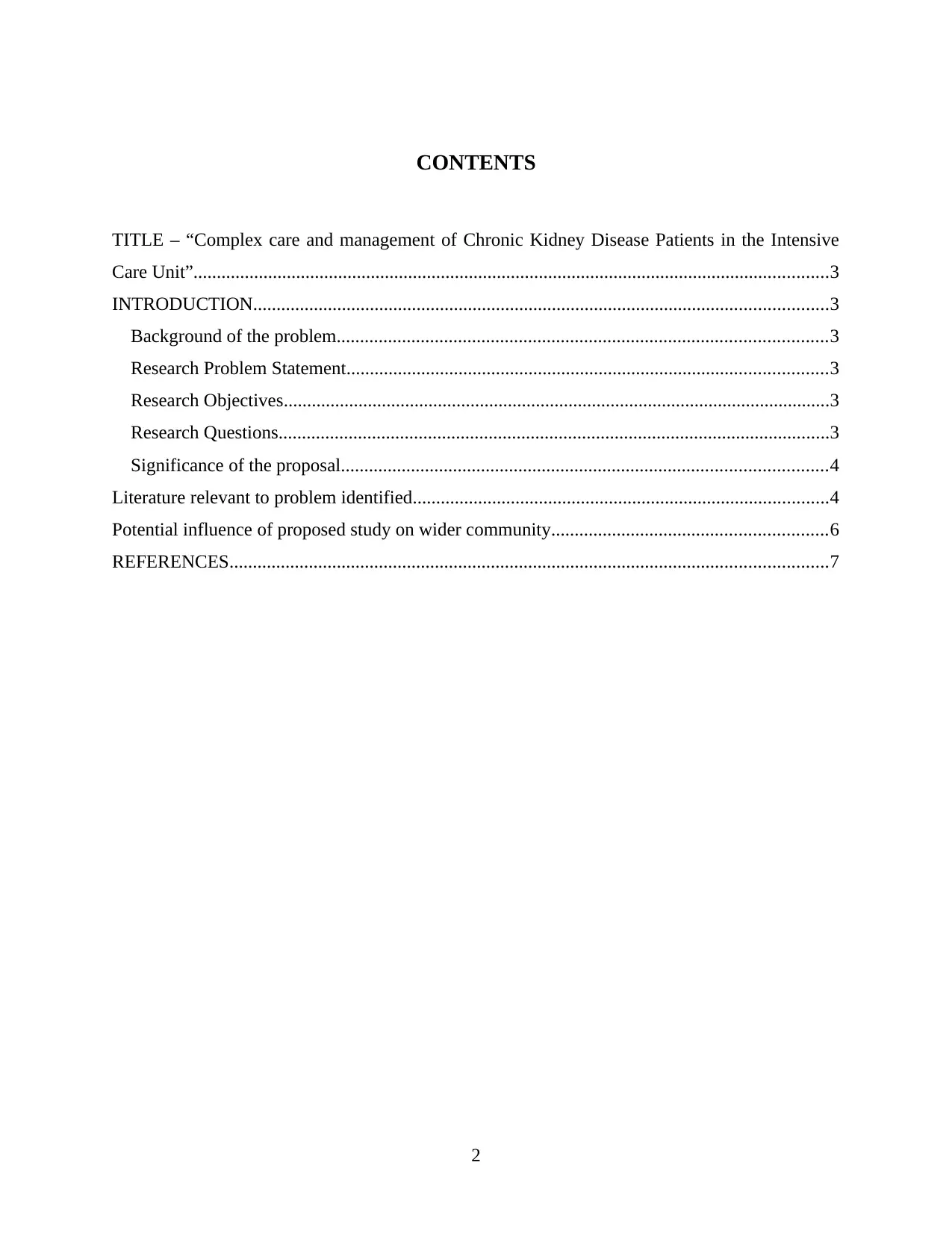
CONTENTS
TITLE – “Complex care and management of Chronic Kidney Disease Patients in the Intensive
Care Unit”........................................................................................................................................3
INTRODUCTION...........................................................................................................................3
Background of the problem.........................................................................................................3
Research Problem Statement.......................................................................................................3
Research Objectives.....................................................................................................................3
Research Questions......................................................................................................................3
Significance of the proposal........................................................................................................4
Literature relevant to problem identified.........................................................................................4
Potential influence of proposed study on wider community...........................................................6
REFERENCES................................................................................................................................7
2
TITLE – “Complex care and management of Chronic Kidney Disease Patients in the Intensive
Care Unit”........................................................................................................................................3
INTRODUCTION...........................................................................................................................3
Background of the problem.........................................................................................................3
Research Problem Statement.......................................................................................................3
Research Objectives.....................................................................................................................3
Research Questions......................................................................................................................3
Significance of the proposal........................................................................................................4
Literature relevant to problem identified.........................................................................................4
Potential influence of proposed study on wider community...........................................................6
REFERENCES................................................................................................................................7
2
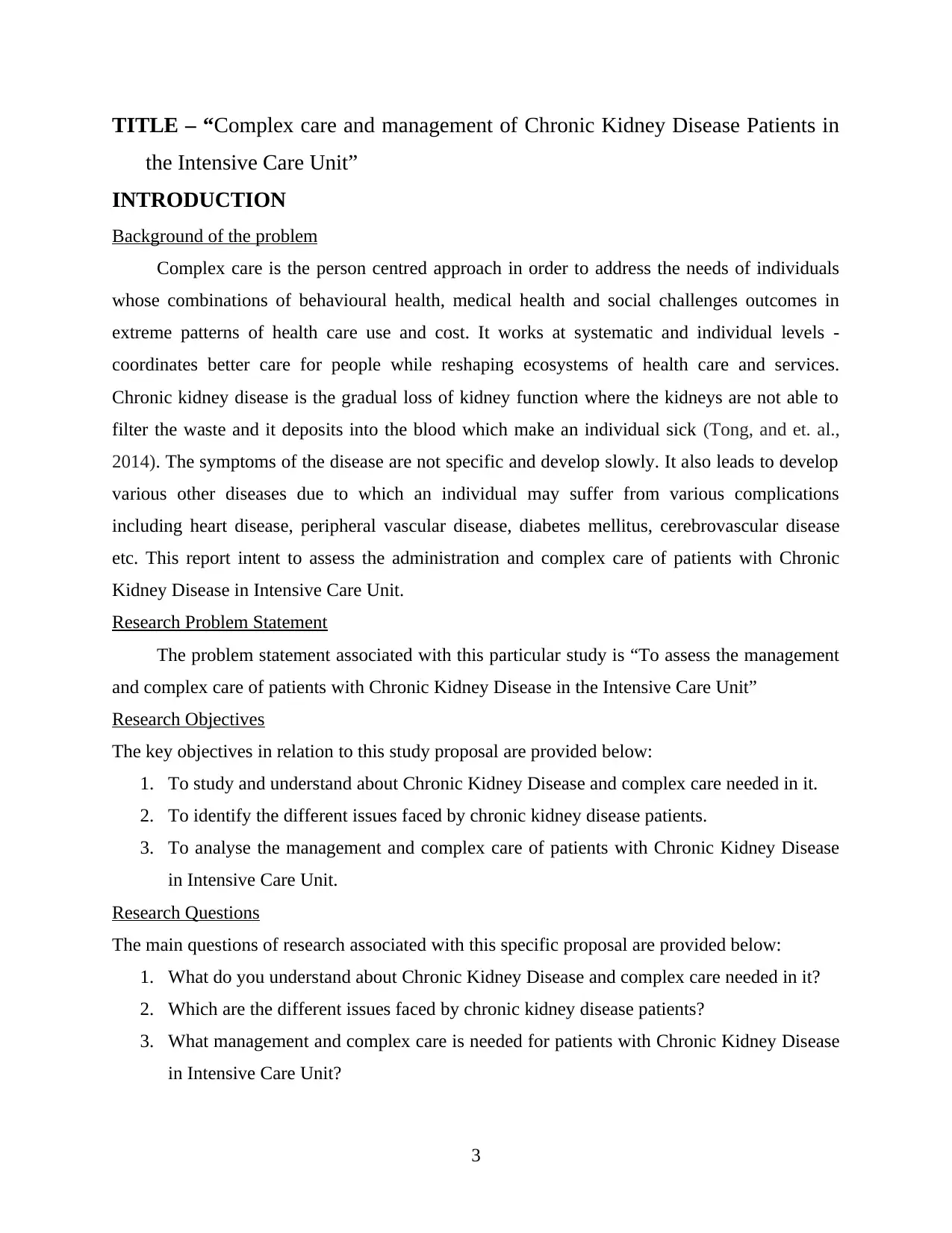
TITLE – “Complex care and management of Chronic Kidney Disease Patients in
the Intensive Care Unit”
INTRODUCTION
Background of the problem
Complex care is the person centred approach in order to address the needs of individuals
whose combinations of behavioural health, medical health and social challenges outcomes in
extreme patterns of health care use and cost. It works at systematic and individual levels -
coordinates better care for people while reshaping ecosystems of health care and services.
Chronic kidney disease is the gradual loss of kidney function where the kidneys are not able to
filter the waste and it deposits into the blood which make an individual sick (Tong, and et. al.,
2014). The symptoms of the disease are not specific and develop slowly. It also leads to develop
various other diseases due to which an individual may suffer from various complications
including heart disease, peripheral vascular disease, diabetes mellitus, cerebrovascular disease
etc. This report intent to assess the administration and complex care of patients with Chronic
Kidney Disease in Intensive Care Unit.
Research Problem Statement
The problem statement associated with this particular study is “To assess the management
and complex care of patients with Chronic Kidney Disease in the Intensive Care Unit”
Research Objectives
The key objectives in relation to this study proposal are provided below:
1. To study and understand about Chronic Kidney Disease and complex care needed in it.
2. To identify the different issues faced by chronic kidney disease patients.
3. To analyse the management and complex care of patients with Chronic Kidney Disease
in Intensive Care Unit.
Research Questions
The main questions of research associated with this specific proposal are provided below:
1. What do you understand about Chronic Kidney Disease and complex care needed in it?
2. Which are the different issues faced by chronic kidney disease patients?
3. What management and complex care is needed for patients with Chronic Kidney Disease
in Intensive Care Unit?
3
the Intensive Care Unit”
INTRODUCTION
Background of the problem
Complex care is the person centred approach in order to address the needs of individuals
whose combinations of behavioural health, medical health and social challenges outcomes in
extreme patterns of health care use and cost. It works at systematic and individual levels -
coordinates better care for people while reshaping ecosystems of health care and services.
Chronic kidney disease is the gradual loss of kidney function where the kidneys are not able to
filter the waste and it deposits into the blood which make an individual sick (Tong, and et. al.,
2014). The symptoms of the disease are not specific and develop slowly. It also leads to develop
various other diseases due to which an individual may suffer from various complications
including heart disease, peripheral vascular disease, diabetes mellitus, cerebrovascular disease
etc. This report intent to assess the administration and complex care of patients with Chronic
Kidney Disease in Intensive Care Unit.
Research Problem Statement
The problem statement associated with this particular study is “To assess the management
and complex care of patients with Chronic Kidney Disease in the Intensive Care Unit”
Research Objectives
The key objectives in relation to this study proposal are provided below:
1. To study and understand about Chronic Kidney Disease and complex care needed in it.
2. To identify the different issues faced by chronic kidney disease patients.
3. To analyse the management and complex care of patients with Chronic Kidney Disease
in Intensive Care Unit.
Research Questions
The main questions of research associated with this specific proposal are provided below:
1. What do you understand about Chronic Kidney Disease and complex care needed in it?
2. Which are the different issues faced by chronic kidney disease patients?
3. What management and complex care is needed for patients with Chronic Kidney Disease
in Intensive Care Unit?
3
⊘ This is a preview!⊘
Do you want full access?
Subscribe today to unlock all pages.

Trusted by 1+ million students worldwide
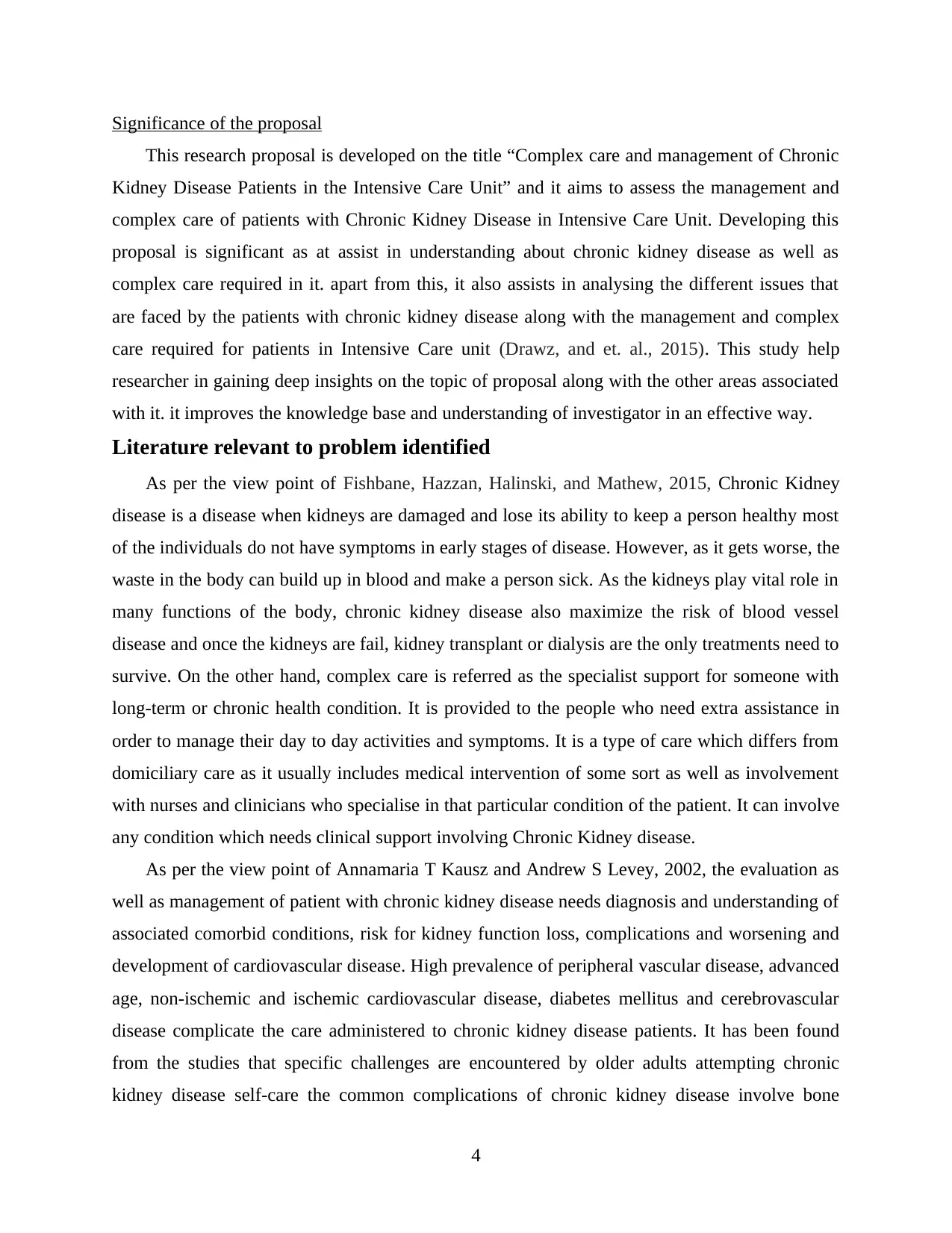
Significance of the proposal
This research proposal is developed on the title “Complex care and management of Chronic
Kidney Disease Patients in the Intensive Care Unit” and it aims to assess the management and
complex care of patients with Chronic Kidney Disease in Intensive Care Unit. Developing this
proposal is significant as at assist in understanding about chronic kidney disease as well as
complex care required in it. apart from this, it also assists in analysing the different issues that
are faced by the patients with chronic kidney disease along with the management and complex
care required for patients in Intensive Care unit (Drawz, and et. al., 2015). This study help
researcher in gaining deep insights on the topic of proposal along with the other areas associated
with it. it improves the knowledge base and understanding of investigator in an effective way.
Literature relevant to problem identified
As per the view point of Fishbane, Hazzan, Halinski, and Mathew, 2015, Chronic Kidney
disease is a disease when kidneys are damaged and lose its ability to keep a person healthy most
of the individuals do not have symptoms in early stages of disease. However, as it gets worse, the
waste in the body can build up in blood and make a person sick. As the kidneys play vital role in
many functions of the body, chronic kidney disease also maximize the risk of blood vessel
disease and once the kidneys are fail, kidney transplant or dialysis are the only treatments need to
survive. On the other hand, complex care is referred as the specialist support for someone with
long-term or chronic health condition. It is provided to the people who need extra assistance in
order to manage their day to day activities and symptoms. It is a type of care which differs from
domiciliary care as it usually includes medical intervention of some sort as well as involvement
with nurses and clinicians who specialise in that particular condition of the patient. It can involve
any condition which needs clinical support involving Chronic Kidney disease.
As per the view point of Annamaria T Kausz and Andrew S Levey, 2002, the evaluation as
well as management of patient with chronic kidney disease needs diagnosis and understanding of
associated comorbid conditions, risk for kidney function loss, complications and worsening and
development of cardiovascular disease. High prevalence of peripheral vascular disease, advanced
age, non-ischemic and ischemic cardiovascular disease, diabetes mellitus and cerebrovascular
disease complicate the care administered to chronic kidney disease patients. It has been found
from the studies that specific challenges are encountered by older adults attempting chronic
kidney disease self-care the common complications of chronic kidney disease involve bone
4
This research proposal is developed on the title “Complex care and management of Chronic
Kidney Disease Patients in the Intensive Care Unit” and it aims to assess the management and
complex care of patients with Chronic Kidney Disease in Intensive Care Unit. Developing this
proposal is significant as at assist in understanding about chronic kidney disease as well as
complex care required in it. apart from this, it also assists in analysing the different issues that
are faced by the patients with chronic kidney disease along with the management and complex
care required for patients in Intensive Care unit (Drawz, and et. al., 2015). This study help
researcher in gaining deep insights on the topic of proposal along with the other areas associated
with it. it improves the knowledge base and understanding of investigator in an effective way.
Literature relevant to problem identified
As per the view point of Fishbane, Hazzan, Halinski, and Mathew, 2015, Chronic Kidney
disease is a disease when kidneys are damaged and lose its ability to keep a person healthy most
of the individuals do not have symptoms in early stages of disease. However, as it gets worse, the
waste in the body can build up in blood and make a person sick. As the kidneys play vital role in
many functions of the body, chronic kidney disease also maximize the risk of blood vessel
disease and once the kidneys are fail, kidney transplant or dialysis are the only treatments need to
survive. On the other hand, complex care is referred as the specialist support for someone with
long-term or chronic health condition. It is provided to the people who need extra assistance in
order to manage their day to day activities and symptoms. It is a type of care which differs from
domiciliary care as it usually includes medical intervention of some sort as well as involvement
with nurses and clinicians who specialise in that particular condition of the patient. It can involve
any condition which needs clinical support involving Chronic Kidney disease.
As per the view point of Annamaria T Kausz and Andrew S Levey, 2002, the evaluation as
well as management of patient with chronic kidney disease needs diagnosis and understanding of
associated comorbid conditions, risk for kidney function loss, complications and worsening and
development of cardiovascular disease. High prevalence of peripheral vascular disease, advanced
age, non-ischemic and ischemic cardiovascular disease, diabetes mellitus and cerebrovascular
disease complicate the care administered to chronic kidney disease patients. It has been found
from the studies that specific challenges are encountered by older adults attempting chronic
kidney disease self-care the common complications of chronic kidney disease involve bone
4
Paraphrase This Document
Need a fresh take? Get an instant paraphrase of this document with our AI Paraphraser
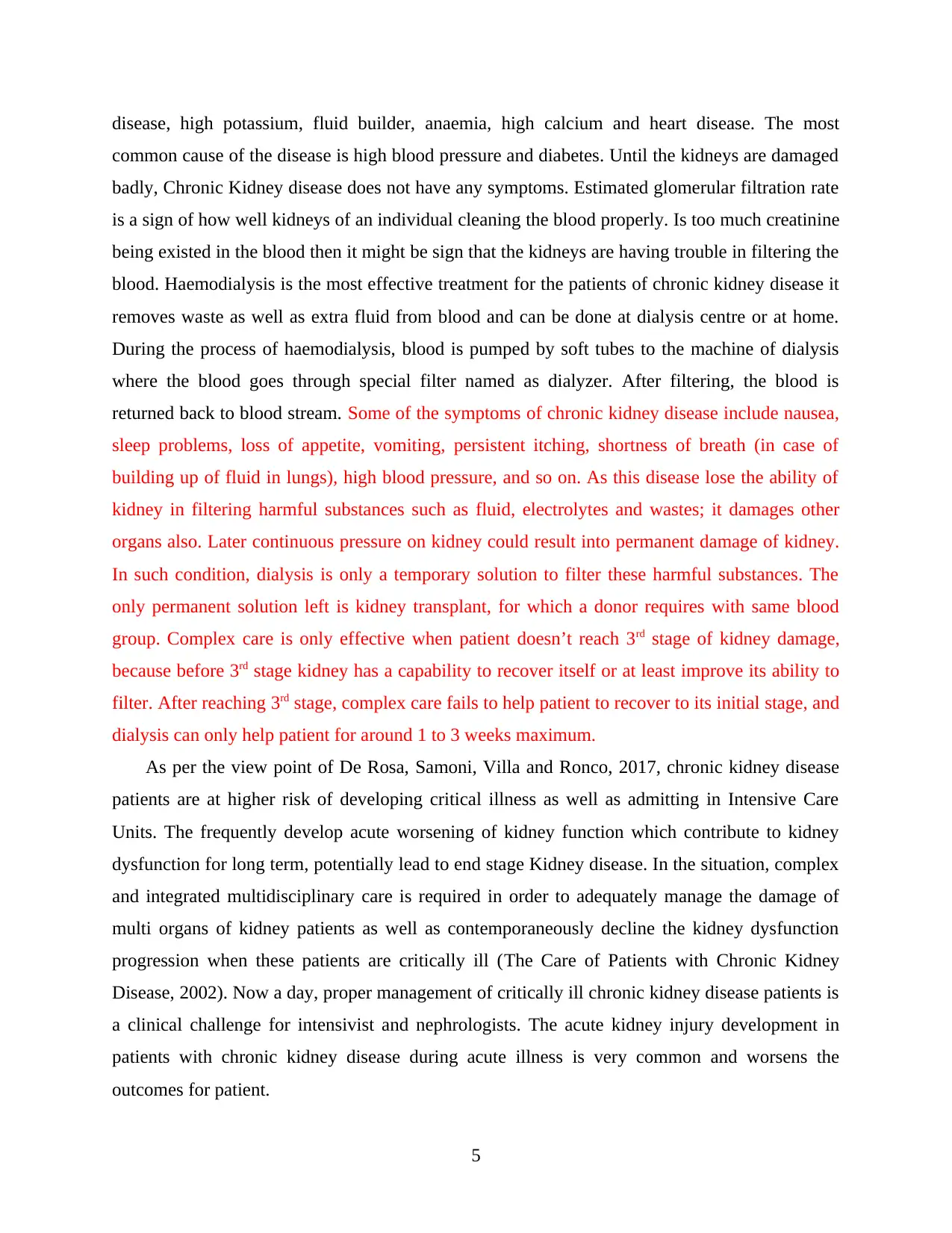
disease, high potassium, fluid builder, anaemia, high calcium and heart disease. The most
common cause of the disease is high blood pressure and diabetes. Until the kidneys are damaged
badly, Chronic Kidney disease does not have any symptoms. Estimated glomerular filtration rate
is a sign of how well kidneys of an individual cleaning the blood properly. Is too much creatinine
being existed in the blood then it might be sign that the kidneys are having trouble in filtering the
blood. Haemodialysis is the most effective treatment for the patients of chronic kidney disease it
removes waste as well as extra fluid from blood and can be done at dialysis centre or at home.
During the process of haemodialysis, blood is pumped by soft tubes to the machine of dialysis
where the blood goes through special filter named as dialyzer. After filtering, the blood is
returned back to blood stream. Some of the symptoms of chronic kidney disease include nausea,
sleep problems, loss of appetite, vomiting, persistent itching, shortness of breath (in case of
building up of fluid in lungs), high blood pressure, and so on. As this disease lose the ability of
kidney in filtering harmful substances such as fluid, electrolytes and wastes; it damages other
organs also. Later continuous pressure on kidney could result into permanent damage of kidney.
In such condition, dialysis is only a temporary solution to filter these harmful substances. The
only permanent solution left is kidney transplant, for which a donor requires with same blood
group. Complex care is only effective when patient doesn’t reach 3rd stage of kidney damage,
because before 3rd stage kidney has a capability to recover itself or at least improve its ability to
filter. After reaching 3rd stage, complex care fails to help patient to recover to its initial stage, and
dialysis can only help patient for around 1 to 3 weeks maximum.
As per the view point of De Rosa, Samoni, Villa and Ronco, 2017, chronic kidney disease
patients are at higher risk of developing critical illness as well as admitting in Intensive Care
Units. The frequently develop acute worsening of kidney function which contribute to kidney
dysfunction for long term, potentially lead to end stage Kidney disease. In the situation, complex
and integrated multidisciplinary care is required in order to adequately manage the damage of
multi organs of kidney patients as well as contemporaneously decline the kidney dysfunction
progression when these patients are critically ill (The Care of Patients with Chronic Kidney
Disease, 2002). Now a day, proper management of critically ill chronic kidney disease patients is
a clinical challenge for intensivist and nephrologists. The acute kidney injury development in
patients with chronic kidney disease during acute illness is very common and worsens the
outcomes for patient.
5
common cause of the disease is high blood pressure and diabetes. Until the kidneys are damaged
badly, Chronic Kidney disease does not have any symptoms. Estimated glomerular filtration rate
is a sign of how well kidneys of an individual cleaning the blood properly. Is too much creatinine
being existed in the blood then it might be sign that the kidneys are having trouble in filtering the
blood. Haemodialysis is the most effective treatment for the patients of chronic kidney disease it
removes waste as well as extra fluid from blood and can be done at dialysis centre or at home.
During the process of haemodialysis, blood is pumped by soft tubes to the machine of dialysis
where the blood goes through special filter named as dialyzer. After filtering, the blood is
returned back to blood stream. Some of the symptoms of chronic kidney disease include nausea,
sleep problems, loss of appetite, vomiting, persistent itching, shortness of breath (in case of
building up of fluid in lungs), high blood pressure, and so on. As this disease lose the ability of
kidney in filtering harmful substances such as fluid, electrolytes and wastes; it damages other
organs also. Later continuous pressure on kidney could result into permanent damage of kidney.
In such condition, dialysis is only a temporary solution to filter these harmful substances. The
only permanent solution left is kidney transplant, for which a donor requires with same blood
group. Complex care is only effective when patient doesn’t reach 3rd stage of kidney damage,
because before 3rd stage kidney has a capability to recover itself or at least improve its ability to
filter. After reaching 3rd stage, complex care fails to help patient to recover to its initial stage, and
dialysis can only help patient for around 1 to 3 weeks maximum.
As per the view point of De Rosa, Samoni, Villa and Ronco, 2017, chronic kidney disease
patients are at higher risk of developing critical illness as well as admitting in Intensive Care
Units. The frequently develop acute worsening of kidney function which contribute to kidney
dysfunction for long term, potentially lead to end stage Kidney disease. In the situation, complex
and integrated multidisciplinary care is required in order to adequately manage the damage of
multi organs of kidney patients as well as contemporaneously decline the kidney dysfunction
progression when these patients are critically ill (The Care of Patients with Chronic Kidney
Disease, 2002). Now a day, proper management of critically ill chronic kidney disease patients is
a clinical challenge for intensivist and nephrologists. The acute kidney injury development in
patients with chronic kidney disease during acute illness is very common and worsens the
outcomes for patient.
5
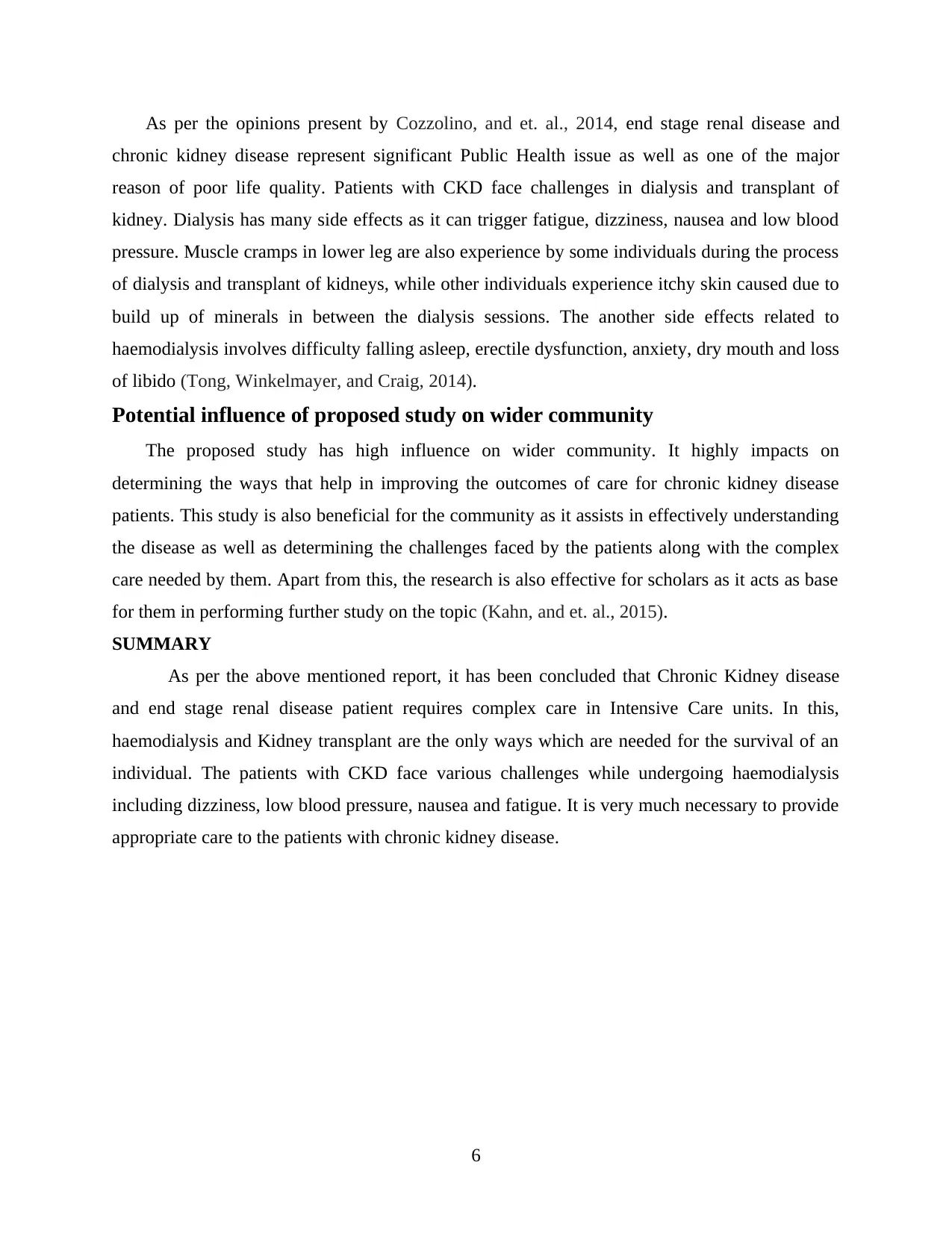
As per the opinions present by Cozzolino, and et. al., 2014, end stage renal disease and
chronic kidney disease represent significant Public Health issue as well as one of the major
reason of poor life quality. Patients with CKD face challenges in dialysis and transplant of
kidney. Dialysis has many side effects as it can trigger fatigue, dizziness, nausea and low blood
pressure. Muscle cramps in lower leg are also experience by some individuals during the process
of dialysis and transplant of kidneys, while other individuals experience itchy skin caused due to
build up of minerals in between the dialysis sessions. The another side effects related to
haemodialysis involves difficulty falling asleep, erectile dysfunction, anxiety, dry mouth and loss
of libido (Tong, Winkelmayer, and Craig, 2014).
Potential influence of proposed study on wider community
The proposed study has high influence on wider community. It highly impacts on
determining the ways that help in improving the outcomes of care for chronic kidney disease
patients. This study is also beneficial for the community as it assists in effectively understanding
the disease as well as determining the challenges faced by the patients along with the complex
care needed by them. Apart from this, the research is also effective for scholars as it acts as base
for them in performing further study on the topic (Kahn, and et. al., 2015).
SUMMARY
As per the above mentioned report, it has been concluded that Chronic Kidney disease
and end stage renal disease patient requires complex care in Intensive Care units. In this,
haemodialysis and Kidney transplant are the only ways which are needed for the survival of an
individual. The patients with CKD face various challenges while undergoing haemodialysis
including dizziness, low blood pressure, nausea and fatigue. It is very much necessary to provide
appropriate care to the patients with chronic kidney disease.
6
chronic kidney disease represent significant Public Health issue as well as one of the major
reason of poor life quality. Patients with CKD face challenges in dialysis and transplant of
kidney. Dialysis has many side effects as it can trigger fatigue, dizziness, nausea and low blood
pressure. Muscle cramps in lower leg are also experience by some individuals during the process
of dialysis and transplant of kidneys, while other individuals experience itchy skin caused due to
build up of minerals in between the dialysis sessions. The another side effects related to
haemodialysis involves difficulty falling asleep, erectile dysfunction, anxiety, dry mouth and loss
of libido (Tong, Winkelmayer, and Craig, 2014).
Potential influence of proposed study on wider community
The proposed study has high influence on wider community. It highly impacts on
determining the ways that help in improving the outcomes of care for chronic kidney disease
patients. This study is also beneficial for the community as it assists in effectively understanding
the disease as well as determining the challenges faced by the patients along with the complex
care needed by them. Apart from this, the research is also effective for scholars as it acts as base
for them in performing further study on the topic (Kahn, and et. al., 2015).
SUMMARY
As per the above mentioned report, it has been concluded that Chronic Kidney disease
and end stage renal disease patient requires complex care in Intensive Care units. In this,
haemodialysis and Kidney transplant are the only ways which are needed for the survival of an
individual. The patients with CKD face various challenges while undergoing haemodialysis
including dizziness, low blood pressure, nausea and fatigue. It is very much necessary to provide
appropriate care to the patients with chronic kidney disease.
6
⊘ This is a preview!⊘
Do you want full access?
Subscribe today to unlock all pages.

Trusted by 1+ million students worldwide
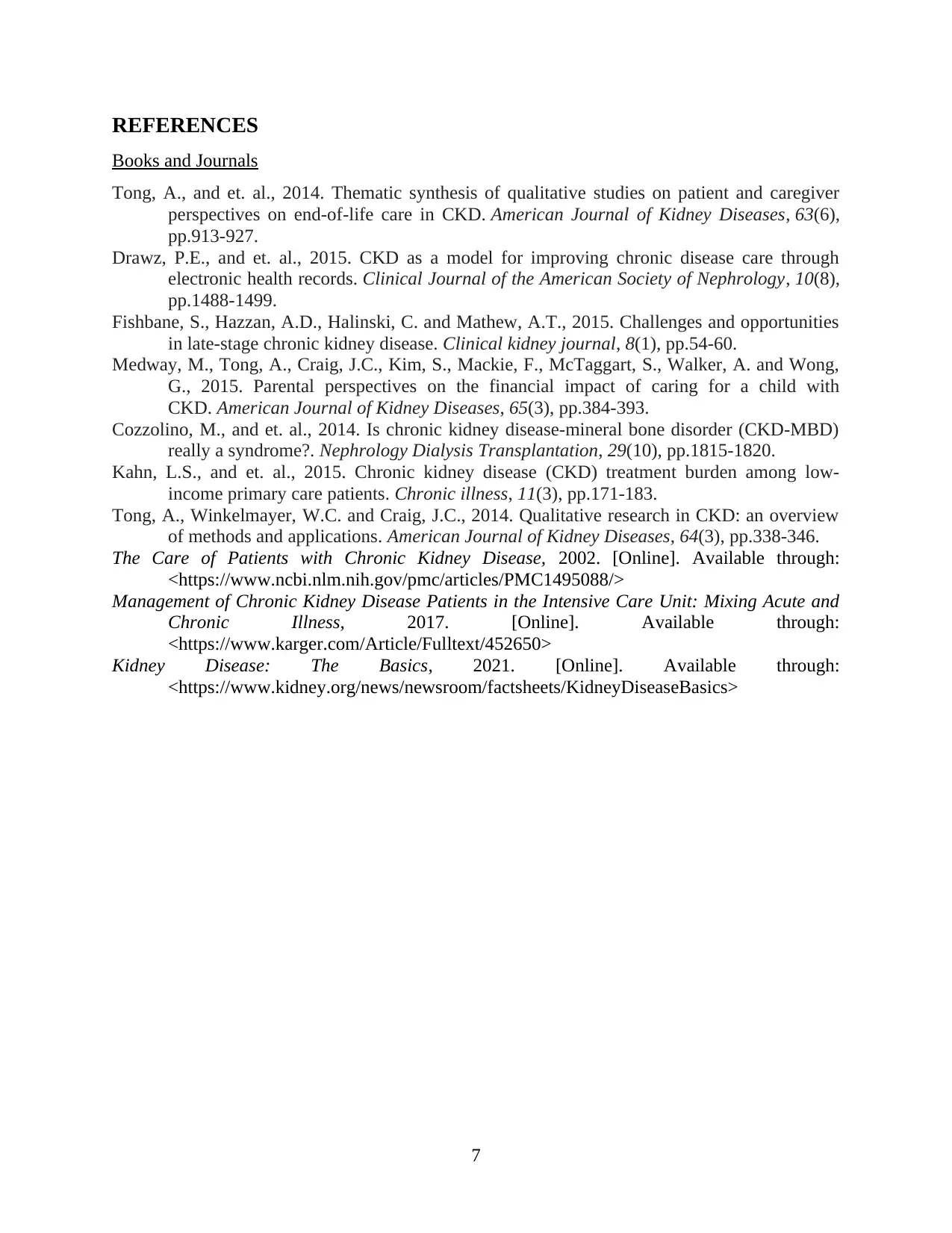
REFERENCES
Books and Journals
Tong, A., and et. al., 2014. Thematic synthesis of qualitative studies on patient and caregiver
perspectives on end-of-life care in CKD. American Journal of Kidney Diseases, 63(6),
pp.913-927.
Drawz, P.E., and et. al., 2015. CKD as a model for improving chronic disease care through
electronic health records. Clinical Journal of the American Society of Nephrology, 10(8),
pp.1488-1499.
Fishbane, S., Hazzan, A.D., Halinski, C. and Mathew, A.T., 2015. Challenges and opportunities
in late-stage chronic kidney disease. Clinical kidney journal, 8(1), pp.54-60.
Medway, M., Tong, A., Craig, J.C., Kim, S., Mackie, F., McTaggart, S., Walker, A. and Wong,
G., 2015. Parental perspectives on the financial impact of caring for a child with
CKD. American Journal of Kidney Diseases, 65(3), pp.384-393.
Cozzolino, M., and et. al., 2014. Is chronic kidney disease-mineral bone disorder (CKD-MBD)
really a syndrome?. Nephrology Dialysis Transplantation, 29(10), pp.1815-1820.
Kahn, L.S., and et. al., 2015. Chronic kidney disease (CKD) treatment burden among low-
income primary care patients. Chronic illness, 11(3), pp.171-183.
Tong, A., Winkelmayer, W.C. and Craig, J.C., 2014. Qualitative research in CKD: an overview
of methods and applications. American Journal of Kidney Diseases, 64(3), pp.338-346.
The Care of Patients with Chronic Kidney Disease, 2002. [Online]. Available through:
<https://www.ncbi.nlm.nih.gov/pmc/articles/PMC1495088/>
Management of Chronic Kidney Disease Patients in the Intensive Care Unit: Mixing Acute and
Chronic Illness, 2017. [Online]. Available through:
<https://www.karger.com/Article/Fulltext/452650>
Kidney Disease: The Basics, 2021. [Online]. Available through:
<https://www.kidney.org/news/newsroom/factsheets/KidneyDiseaseBasics>
7
Books and Journals
Tong, A., and et. al., 2014. Thematic synthesis of qualitative studies on patient and caregiver
perspectives on end-of-life care in CKD. American Journal of Kidney Diseases, 63(6),
pp.913-927.
Drawz, P.E., and et. al., 2015. CKD as a model for improving chronic disease care through
electronic health records. Clinical Journal of the American Society of Nephrology, 10(8),
pp.1488-1499.
Fishbane, S., Hazzan, A.D., Halinski, C. and Mathew, A.T., 2015. Challenges and opportunities
in late-stage chronic kidney disease. Clinical kidney journal, 8(1), pp.54-60.
Medway, M., Tong, A., Craig, J.C., Kim, S., Mackie, F., McTaggart, S., Walker, A. and Wong,
G., 2015. Parental perspectives on the financial impact of caring for a child with
CKD. American Journal of Kidney Diseases, 65(3), pp.384-393.
Cozzolino, M., and et. al., 2014. Is chronic kidney disease-mineral bone disorder (CKD-MBD)
really a syndrome?. Nephrology Dialysis Transplantation, 29(10), pp.1815-1820.
Kahn, L.S., and et. al., 2015. Chronic kidney disease (CKD) treatment burden among low-
income primary care patients. Chronic illness, 11(3), pp.171-183.
Tong, A., Winkelmayer, W.C. and Craig, J.C., 2014. Qualitative research in CKD: an overview
of methods and applications. American Journal of Kidney Diseases, 64(3), pp.338-346.
The Care of Patients with Chronic Kidney Disease, 2002. [Online]. Available through:
<https://www.ncbi.nlm.nih.gov/pmc/articles/PMC1495088/>
Management of Chronic Kidney Disease Patients in the Intensive Care Unit: Mixing Acute and
Chronic Illness, 2017. [Online]. Available through:
<https://www.karger.com/Article/Fulltext/452650>
Kidney Disease: The Basics, 2021. [Online]. Available through:
<https://www.kidney.org/news/newsroom/factsheets/KidneyDiseaseBasics>
7
1 out of 7
Related Documents
Your All-in-One AI-Powered Toolkit for Academic Success.
+13062052269
info@desklib.com
Available 24*7 on WhatsApp / Email
![[object Object]](/_next/static/media/star-bottom.7253800d.svg)
Unlock your academic potential
Copyright © 2020–2025 A2Z Services. All Rights Reserved. Developed and managed by ZUCOL.





